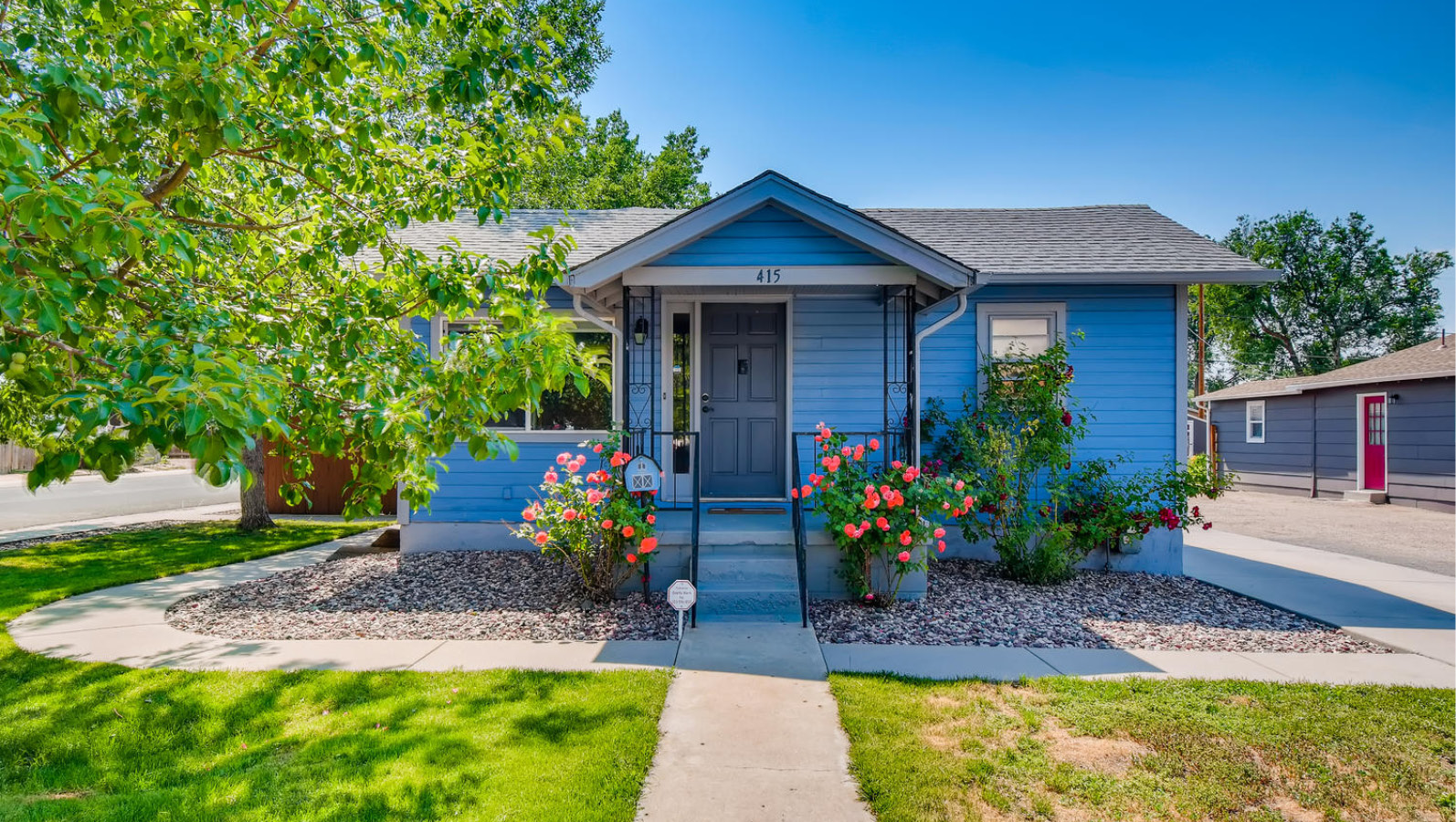Your Ultimate Guide to Buying Your First Home
Back in 1990, I was a first-time home buyer and scared to death. I had a good job, but the thought of paying $86,000 for a 2 bedroom ranch in southeast Denver filled me with the utmost trepidation. My interest rate was 7 percent and my monthly payment was $500, all which seemed like a lot of money at the time.
Fast-forward 30 years. Real estate prices has skyrocketed and interest rates have plummeted. The median cost of a house in Denver is often well north of $450,000 and interest rates are under 4 percent.
There are few, if any, $86,000 homes out there but, regardless of the cost, most first-time home buyers still feel the apprehension of buying a new home.
Regardless of the current market conditions, becoming a first time home buyer covers a myriad of emotions. From elation of getting out of the revolving rental routine to setting budgets for home maintenance, insurance and taxes, becoming a homeowner is an experience like none other. It’s exciting, nerve wracking, thrilling and yes, even a little intimidating (but that doesn’t last long). It most likely signals a whole new chapter in your life.
For many, having a place of your own symbolizes the American dream. Much has been written about how owning your home not only makes good sense financially but improves your well being. Owning your home has many benefits, many of which some people don’t even realize.
It’s a Great Investment
According to an article in the Denver Post in January of 2020, “the median home price in metro Denver has shot up from $202,896 to $424,051, reports Daryl Fairweather, chief economist with the Seattle-based real estate brokerage Redfin. That works out to a compounded annual average gain of 7.65% a year, compared to compounded wage gains of 2.3% a year over the same time frame.” A good way of looking at real estate is viewing it as a savings account that provides powerful interest each year, usually on par and often more than stocks or bonds.
Building Equity
When you are just starting out on your own, renting is almost a mandatory right of passage. It’s important to learn how to pay a monthly fee for your housing and budget your money accordingly. But keep in mind, when you rent, you are not investing in anything. Owning a home is a great investment and what you save on your taxes is significant. The value of a home typically rises at least 2 percent per year. Building equity (the difference between your home’s value and how much you owe your mortgage lender) in your home is an easy way to invest towards your retirement or future home improvement projects.
One of the main reasons people decide to become a first time home buyer is the continuing escalation of rent in Denver. As of May 2020, according to Rent Jungle, the average rent for an apartment in Denver, CO is $1,644 which is a 2.37% increase from last year when the average rent was $1605. This is also a 4.26% increase from last month when the average rent was $1,574.
Oftentimes, what you are paying in rent can be translated into a mortgage payment instead. For example, buying a $400,000 home with 20% down and a 5% interest rate, your principal and interest rate mortgage payment could be around $1,718 a month (this doesn’t include insurance, taxes, or PMI insurance if you don’t have 20% down). If you only have 5% to put down, that P&I monthly payment could be around $2,040 (not including insurance or taxes). Meeting with a lender will tell you the exact cost of owning a home. Reach out to Usaj Realty to get started.
Social and Health Benefits
According to report by the National Association of Realtors, “owning a home embodies the spirit of individual autonomy and is the aspiration of most American households. Homeownership allows households to accumulate wealth and social status, and is the basis for a number of positive social, economic, family and civic outcomes. Many studies found that homeownership still provides a variety of social benefits. Homeownership boosts the educational performance of children, induces higher participation in civic and volunteering activity, improves health care outcomes, lowers crime rates and lessens welfare dependency. With a home purchase comes the pride of ownership and the sense of belonging in a community where one has a financial stake in the neighborhood. Also, ownership entails greater individual responsibility … More recent studies have found that the wealth building effect of homeownership and the sense of control it provides to homeowners in a stable housing market affect homeowners’ mental and physical health in a positive way.”

Great Public Transportation/Ride Share Options
Even if you can’t find a home in the city of Denver, the outlying metro area offers a number of housing options that are close to the RTD light rail and bus lines. Being close to public transportation makes accessing all the the city has to offer incredibly easy and convenient. In many cases, you can get from the suburbs to downtown Denver in less than 20 minutes and not have to deal with parking or traffic. Whether you buy a home downtown or in the suburbs, it’s likely a bus connection or light rail station is going to be nearby to take you to your desired location in the Denver metro area. Ride sharing is also easily accessible.
There are many benefits to living outside of the city limits. Typically, you can get more “bang for your buck” in the suburbs. Many people seek high performing schools, access to recreational opportunities, homes with acreage or just calmer lifestyle outside of the city. Regardless of your personal situation, the greater Denver metro area is bound to have the right home for you.
Why Buy in Denver?
What makes Denver a unique city where it is better to buy? Here are some powerful market conditions that help explain why:
- Historically low mortgage rates: Mortgage interest rates are now under 4% which is incredibly low. With the right realtor on your side, borrowers can make a wise investment and get a home with a low monthly mortgage payment. With current trends, these rates are predicted to remain low, and these attractive rates make now a prime time to invest in a home.
- Mortgage loans are more accessible. With a variety of down payment options and lender options, becoming a homeowner is more attainable than you probably think. The Colorado Housing and Finance Authority helps first time home buyers achieve homeownership. According the CHFA, they have invested more than $22 billion in Colorado’s economy and have helped 121,559 Colorado homebuyers achieve homeownership.
- Job stability and quality of life: Denver is consistenly ranked as one of the best cities to live in the U.S. Young professionals have flocked to Denver for the lively social scene and outdoor activities. There are vibrant restaurants, food halls, bars, art and culture, and sports and recreation opportunities everywhere.
- Financial planning: Buying a home means your monthly payments will stay constant so you can better plan for the future. When renting, you’re likely to pay more every year for rent increases. Plus you build equity and receive tax breaks when you become a homeowner.
Once you make the commitment to becoming a homeowner, it’s important to know all the steps in the home buying process and the financial pieces of being homeowner. Listed below are some of the keys to a successful journey in buying a home.
It’s Not Just a Mortgage You’ll Be Paying Each Month
Unless you are able to make a cash deal, you’ll have to pay a mortgage each month. This means becoming pre-approved by a trusted lender. You’ll never know if home ownership is achievable unless you set up a meeting with a lender and find out where you stand relative to your finances. Taking that first step is imperative and it’s relatively fast and painless.
Getting a pre-approval sounds pretty scary, doesn’t it? As long as you have the patience and focus to gather up all the necessary documents and paperwork to provide your lender, you’ll be fine. Be prepared to show an ID, tax returns, pay stubs, bank statements including checking, saving, brokerage statements, 401K, IRAs, Roth, etc. It’s critical to show all sources of income as well as financial obligations. Assuming all the documents are in order, the pre-approval process usually goes pretty quickly and best of all, will help you determine how much home you’ll be able to afford. Worse case scenario will be that you’ll see what your financial picture looks like and the steps you can take to qualify for a loan in the future.
And remember, it isn’t just the mortgage you’ll be paying each month. Homeownership comes with having to pay property taxes, homeowner insurance, cable, internet, water, gas and electric, and possibly homeowners’ association fees. You should also budget for home improvements and an emergency fund to cover big repairs/replacements (furnace, air conditioning, large appliances, etc).
The Down Payment
The down payment aspect of buying a home is still one of the biggest concerns of potential home buyers. Many people are still under the impression that a 20 percent down payment is necessary and that’s just not the case anymore. A 2019 survey by TransUnion found in a survey that 41% of people believe a high down payment is required to purchase a home. In fact, there are many low down payment loans and programs available. New data shows that a lower down payment may even be better for many new buyers, as it provides a valuable cash cushion. Research by the JPMorgan Chase Institute found that liquidity — having at least three months of mortgage payments available — is a better measure of homeownership success than a large down payment.
The Colorado Housing and Finance Authority (CHFA) offers financial resources to help first time home buyers with down payment assistance as well as finding affordable first mortgages. These packages have enabled over 100,000 Colorado homebuyers to achieve homeownership, according to CHFA. Often lenders can be found that will offer reduced closing costs and no mortgage insurance, even with a low down payment.
For more information on down payment assistance. you can check out downpaymentresource.com.
Check Into a Mortgage Credit Certification (MCC)
Many people are not familiar with this little-known program that will give you a direct tax credit as a percentage of your mortgage interest each year. Don’t confuse this with the federal mortgage interest tax deduction.
The MCC is a direct tax credit up to a maximum of $2000 in any given year. This is a direct dollar-for-dollar reduction of your tax liability. When exploring your loan options, make sure to ask your lender about the MCC program.
Interest Rates Are Still Incredibly Low
Mortgage interest rates are still at historic lows and who knows where they’ll be in the next few years. It’s important to take advantage of these low rates and make the American dream of owning a home a reality.
The Fun Part
Once you are pre-approved, then you’ll be ready to actually start looking for your new home.
There is no single objective way to determine whether a home is right for a particular buyer. However, there are many objective criteria that prospective home buyers can use to flesh out the kind of home they want, and limit their home search to properties that meet those requirements. When homebuyers carefully evaluate the aspects for each home they are considering, they will have a better idea if the property will suit them appropriately. Here are some home buyer tips to keep in mind when searching for a new home.
Location
While location is a crucial part of the decision-making process, it should be part of the bigger picture. Buying a home that doesn’t fit a buyer’s needs but happens to be in a good location may not be the most practical choice. Proximity to necessary or wanted services, access to good schools and ease of getting from one place or another are all viable reasons buyers might prefer one location over another. Prioritize the neighborhoods that appeal to you and the criteria that is most important, i.e. schools vs. proximity to work vs. nearby service providers.
Size
The size of the home is often a vital factor, but it may be tricky to decide on the right size. The house/condo/townhome that you are considering should be appropriate for the present but what about the future? How long are planning to live in the home? Are you planning to start a family? Will the home accommodate a growing family? Furthermore, one must assess size on two important levels: square footage and spaciousness. A 2,000 square foot home might have three bedrooms or five. It might have huge, walk-in closets, or very little storage space at all. It may feel open and airy, or have small rooms and feel cramped.
Style and Layout
For the amount you invest in a home, you should feel comfortable and happy with the home’s architectural style, design and overall layout. For a home in which a person might live for decades, aesthetic pleasure is important and ultimately ascribes value to the home. A one-story ranch might be more appropriate for someone who wants free, fast movement from one end of the home to another. A buyer who prefers to keep the sleeping areas more private from visitors might prefer to have the bedrooms on a second floor. Similarly, open floor plans are quite popular, but people who like a separation between the individual zones of the home’s living areas are not obligated to follow current conventions. Finally, keep in mind if the home’s layout and structure is amenable to an addition, remodel or other structural change. Know in advance if there is room for that extra bedroom, office or bathroom.
Price
The sale price of the home is usually the biggest factor when considering a new home. The amount of your down payment and loan will dictate how much you may spend. Financial experts often recommend that buyers not buy homes at the top end of their budget in order to avoid problems in maintaining the property. Also, it is recommended you allot 28 percent or less of your pre-tax income to your monthly mortgage. To achieve these objectives, you may have to alter your search criteria and have a plan B.
Property/Area Amenities
Does the property have what’s important to you? Can the neighborhood or nearby areas provide what you cannot get from the property? Will the property support improvements or additions in the future? Making upgrades can often solve problems that are inherent at the time of purchase, but there are exceptions. No amount of maximizing space will turn a small yard into a big one. A careful analysis of the amenities of the property and the general region will help buyers determine if the property is appropriate for the present and the future.
Overall Condition
A “fixer-upper” varies in meaning from one individual to another. A house on the market that needs improvement bears considerable weight when potential buyers are considering the property. Knowing how much money will have to be spent on repairs and improvements can make or break the deal. A home that needs a little TLC or a few upgrades might be ideal for someone who is looking for a property that can be customized and wants to save some money on the purchase. People who are too busy or otherwise uninterested in making serious upgrades are better off buying a home that is move-in ready.
Resale Value
Over a long period of time, properties should appreciate. Buyers who are not planning to live in the home for decades should carefully research the real estate trends in desired neighborhoods, and get an expert opinion on the expected resale values in the future. Choosing a stable or upcoming location, and buying a property in good condition at a reasonable price are excellent ways to increase the likelihood of a good resale value. Every buyer is unique, with opinions that emphasize or eliminate certain types of properties. Few buyers will find the truly perfect home, so it’s important to focus on the key attributes you want in a home and eliminate the deal breakers. This helps avoid buyers’ remorse and ensures a good investment for years to come.
For more information on buying a home, read our blog!




